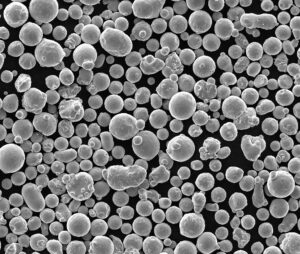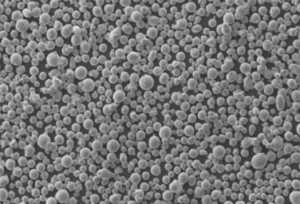عندما يتعلق الأمر بسبائك اللحام بالنحاس، خاصةً للتطبيقات الصناعية, مسحوق BNi-7 هو اسم غالبًا ما يتردد في المحادثات التقنية. يبرز هذا المسحوق بسبب خصائصه وتركيباته وتطبيقاته الفريدة في مختلف القطاعات. ولكن ما هو بالضبط مسحوق BNi-7؟ وكيف يختلف عن مساحيق اللحام النحاسي الأخرى، وما المزايا التي يقدمها عن منافسيه؟ في هذا الدليل الشامل، سوف نتعمق في هذا الدليل الشامل في تعقيدات مسحوق BNi-7، ونستكشف كل شيء بدءًا من تركيبته الكيميائية إلى تطبيقاته ومزاياه في العالم الحقيقي.
اربطوا أحزمة الأمان لأننا سنتطرق إلى التفاصيل الدقيقة، ونجيب على جميع أسئلتكم الملحة أثناء مقارنته بالمساحيق الأخرى لمعرفة أين يتألق وأين قد يقصر.
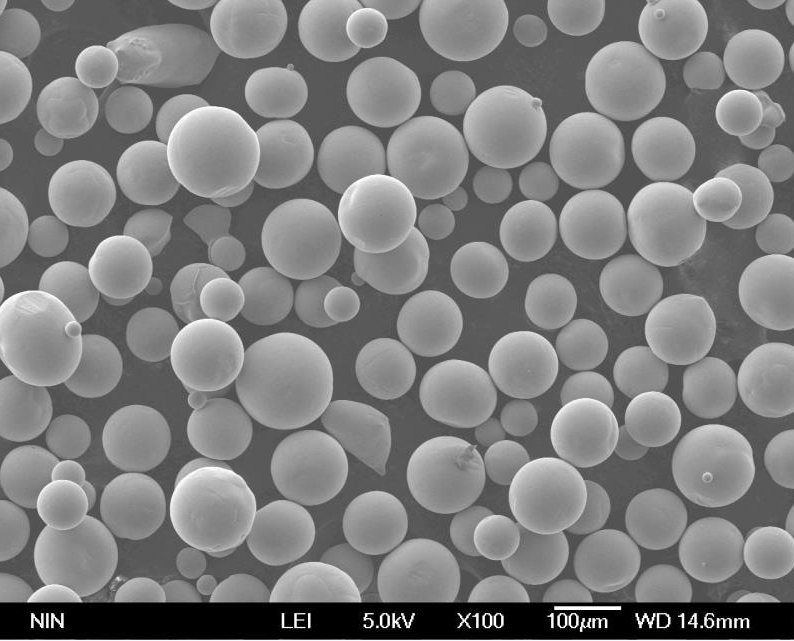
نظرة عامة على مسحوق BNi-7
مسحوق BNi-7 هو معدن حشو نحاسي قائم على النيكل يستخدم على نطاق واسع في تطبيقات اللحام بالنحاس في درجات الحرارة العالية. وهو معروف بخصائص التدفق الممتازة، ومقاومته للتآكل، وتوافقه مع المواد الأساسية المختلفة مثل الفولاذ المقاوم للصدأ، والسبائك الفائقة، والمعادن المقاومة للحرارة. ويحظى BNi-7 بتقدير خاص لنقطة انصهاره المنخفضة، مما يجعله مثاليًا للتطبيقات التي تتطلب لحامًا نحاسيًا دقيقًا ومنخفض الحرارة مع الحفاظ على قوة الوصلات.
ما الذي يجعل مسحوق BNi-7 مميزًا للغاية؟ يكمن السر في تركيبته الدقيقة وقدرته على التكيف في البيئات الصعبة حيث تكون القوة الميكانيكية والمقاومة الكيميائية والاستقرار الحراري ذات أهمية قصوى.
الميزات الرئيسية لمسحوق BNi-7:
- سبيكة أساسها النيكل مع كمية كبيرة من البورون والسيليكون.
- نقطة انصهار أقل مقارنةً بمساحيق اللحام النحاسي الأخرى المصنوعة من النيكل.
- مقاومة ممتازة للأكسدة والتآكل.
- مثالية للاستخدام في صناعة الطيران والسيارات والمبادلات الحرارية.
- تُشكّل وصلات قوية ومتينة دون الحاجة إلى تعريضها للحرارة الشديدة.
| الممتلكات الرئيسية | مسحوق BNi-7 |
|---|---|
| نطاق الذوبان | 970 درجة مئوية - 1000 درجة مئوية |
| التركيب | ني ، سي ، ب ، ب ، في ، ج |
| مقاومة التآكل | عالية |
| التوافق | الفولاذ المقاوم للصدأ، السبائك الفائقة، إلخ. |
| قابلية التدفق | ممتاز |
تركيب مسحوق BNi-7
يتميز مسحوق BNi-7 بتركيبة متخصصة تمنحه ميزة في بعض التطبيقات. المكونات الأكثر أهمية في مسحوق BNi-7 هي النيكل (Ni) والسيليكون (Si) والبورون (B). ويلعب كل عنصر دورًا حاسمًا في كيفية أداء المسحوق أثناء اللحام بالنحاس ويؤثر على الخصائص الكلية للمفصل النهائي.
تفاصيل التركيب
| العنصر | النسبة المئوية للتركيب (%) | الدور |
|---|---|---|
| النيكل (ني) | 92 - 93.5 | يوفر السلامة الهيكلية ومقاومة التآكل. |
| السيليكون (Si) | 4.5 - 5.5 | يقلل من درجة الانصهار ويعزز خصائص التدفق. |
| البورون (B) | 1.4 - 1.8 | يعمل كمخفض لدرجة الذوبان ويحسن قابلية التبلل. |
| الكربون (C) | ≤ 0.06 | يتحكم في البنية المجهرية للمفصل والصلابة. |
| الحديد (Fe) | ≤ 0.5 | يساعد في زيادة القوة دون التأثير على التدفق. |
ويمنح النيكل، وهو المكون الأساسي، مادة BNi-7 متانتها ومقاومتها لدرجات الحرارة العالية والأكسدة، بينما يساعد السيليكون المادة على التدفق بسلاسة أثناء اللحام بالنحاس. من ناحية أخرى، يقلل البورون من درجة الانصهار ويساعد في الترطيب، وهو أمر ضروري لتشكيل روابط قوية ومتسقة.
أنواع مسحوق BNi-7 والبدائل
على الرغم من أن مسحوق BNi-7 ممتاز لتطبيقات محددة، إلا أنه من الضروري معرفة بدائله، خاصةً عندما تقارن الخيارات بناءً على التكلفة أو الأداء أو الاحتياجات البيئية المحددة. فيما يلي قائمة ب 10 مساحيق لحام نحاسية شهيرة، بما في ذلك BNi-7، مع خصائصها المحددة:
مساحيق اللحام بالنحاس وأوصافها
| مسحوق اللحام بالنحاس | التركيب | درجة الانصهار (درجة مئوية) | الميزات الرئيسية | التطبيقات |
|---|---|---|---|---|
| BNi-1 | ني، سي، بي، في | 955 - 1005 | قوة أعلى ولكن درجة انصهار أعلى | الفضاء الجوي، بيئات الضغط العالي |
| BNi-2 | ني ، كروم ، سيليوم ، ب | 970 - 1025 | قوي ومقاوم للتآكل | شفرات التوربينات، والمبادلات الحرارية |
| BNi-3 | ني، سي، ب | 980 - 1065 | قوة عالية مع تدفق معتدل | فولاذ مقاوم للصدأ، وصلات عالية القوة |
| BNi-4 | ني ، كروم ، سيليوم ، ب | 1000 - 1100 | تدفق ومقاومة ممتازة | مناطق مقاومة لدرجات الحرارة العالية والتآكل |
| BNi-5 | ني ، كروم ، سيليوم ، ب | 1050 - 1120 | مقاومة فائقة للتآكل | البيئات الكيميائية القاسية |
| BNi-6 | ني ، كروم ، سيليوم ، ب | 1050 - 1100 | متعدد الاستخدامات، رائع للمفاصل عالية الحرارة | الأفران الصناعية والسيارات |
| BNi-7 | ني، سي، ب | 970 - 1000 | درجة حرارة منخفضة، وتدفق عالي، ومقاومة ممتازة للتآكل | الفضاء، والمبادلات الحرارية، والإلكترونيات |
| CuP-7 | النحاس، ف | 645 - 780 | درجة انصهار منخفضة، ممتازة للنحاس | السباكة وأنظمة التدفئة والتهوية وتكييف الهواء |
| Ag-45Cd | الأجاج، والكادميوم، والزنك، والنحاس | 605 - 620 | ليونة عالية، درجة انصهار منخفضة | الإلكترونيات والأدوات الدقيقة |
| NiCrSi-B-4 | ني ، كروم ، سيليوم ، ب | 980 - 1080 | قوة وليونة عالية | وصلات عالية المتانة، وشفرات التوربينات |
وعلى الرغم من أن BNi-7 يعد BNi-7 متميزًا في التطبيقات ذات درجات الحرارة المنخفضة مع خصائص تدفق ممتازة، إلا أنه يتمتع بمنافسة قوية. تعد المساحيق مثل BNi-5 أكثر ملاءمة لمقاومة المواد الكيميائية، في حين أن BNi-6 أكثر تنوعًا في التعامل مع مجموعة واسعة من ظروف درجات الحرارة العالية.
خصائص مسحوق BNi-7
ما الذي يجعل مسحوق BNi-7 جذابًا جدًا للصناعات في جميع المجالات؟ الأمر كله يتعلق بالخصائص.
- درجة انصهار منخفضة: يذوب مسحوق BNi-7 عند درجة حرارة منخفضة نسبيًا (بين 970 درجة مئوية و1000 درجة مئوية). وهذا يجعلها مثالية للتطبيقات التي لا ترغب في تعريض المواد الخاصة بك للحرارة الزائدة.
- انسيابية ممتازة: تسمح تركيبة BNi-7 بالتدفق بسلاسة في الوصلات، مما يخلق روابط موحدة ومتسقة دون الحاجة إلى الكثير من التلاعب.
- مقاومة التآكل: وبفضل محتواه العالي من النيكل، يتميز BNi-7 بمقاومة عالية للأكسدة والتآكل، حتى في البيئات القاسية. وهذا يجعله مثاليًا للاستخدام في الصناعات عالية الإجهاد مثل صناعة الطيران والسيارات.
- التوافق مع المواد المختلفة: سواءً كنت تعمل مع الفولاذ المقاوم للصدأ أو السبائك الفائقة أو المعادن المقاومة للحرارة، فإن BNi-7 يمكنه التعامل معها. وتعد تعدد استخداماته أحد أسباب استخدامه على نطاق واسع في مختلف التطبيقات الصناعية.
الخصائص الرئيسية لمسحوق BNi-7
| الخصائص | التفاصيل |
|---|---|
| نطاق الذوبان | 970 درجة مئوية - 1000 درجة مئوية |
| مقاومة التآكل | ممتاز، خاصة في البيئات ذات درجات الحرارة العالية والبيئات المؤكسدة |
| قابلية التدفق | تدفق سلس وسهل في المفاصل |
| الصلابة | صلابة معتدلة، يمكن تحسينها من خلال المعالجة الحرارية |
| التوافق | مناسب للفولاذ المقاوم للصدأ، والسبائك الفائقة، والسبائك الفائقة وسبائك النيكل الأخرى |
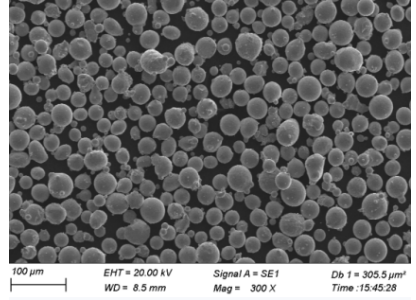
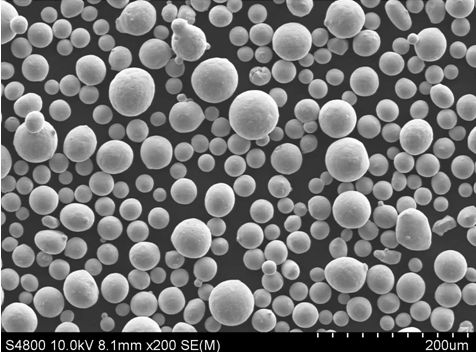
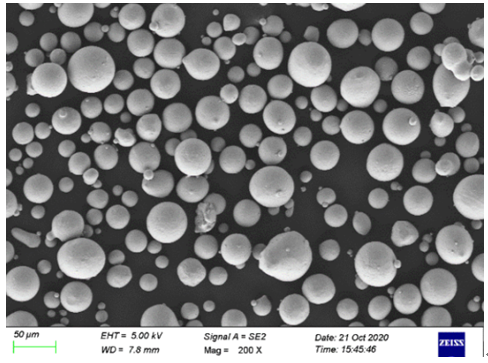
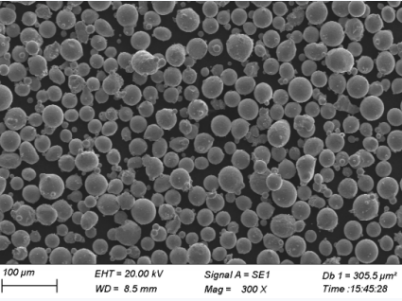
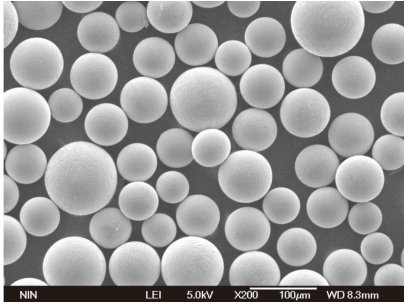

تطبيقات مسحوق BNi-7
مسحوق BNi-7 هو المادة المفضلة لمجموعة واسعة من التطبيقات الصناعية نظرًا لخصائصه الميكانيكية الرائعة وتعدد استخداماته. من الفضاء الجوي إلى الإلكترونيات، إليك نظرة مفصلة على الاستخدامات المختلفة لمسحوق BNi-7.
تطبيقات مسحوق BNi-7
| الصناعة | التطبيقات |
|---|---|
| الفضاء | لحام شفرات التوربينات وغرف الاحتراق وأجزاء المحرك ذات درجة الحرارة العالية بالنحاس. |
| السيارات | تستخدم في أنظمة العادم، والمحولات الحفازة، والمبادلات الحرارية. |
| الإلكترونيات | مثالي لربط المكونات في الأجهزة الإلكترونية بسبب اللحام بالنحاس في درجات حرارة منخفضة. |
| أنظمة التدفئة والتهوية وتكييف الهواء | لحام مكونات النحاس والفولاذ المقاوم للصدأ بالنحاس في التدفئة والتهوية وتكييف الهواء. |
| الأجهزة الطبية | تُستخدم في الأدوات الدقيقة حيث تكون الوصلات القوية والمقاومة للتآكل ضرورية. |
| قطاع الطاقة | ضروري لمكونات اللحام بالنحاس في التوربينات وأنظمة المبادلات الحرارية. |
| السباكة | شائع في أعمال السباكة نظراً لقدرته على تشكيل سدادات قوية مانعة للتسرب. |
إن قدرة BNi-7 على التكيف ودرجة حرارة الانصهار المنخفضة والمتانة تجعله الخيار الأول للصناعات التي تعتمد على الروابط المتسقة عالية الأداء في ظل الظروف الصعبة.
المواصفات والمقاسات والمعايير
بالنسبة لأولئك الذين يعملون في صناعات متخصصة، من الضروري الالتزام بمقاسات ومعايير ودرجات محددة عند العمل مع مسحوق BNi-7. وهذا يضمن السلامة والموثوقية والاتساق في عمليات التصنيع.
مواصفات مسحوق BNi-7
| الممتلكات | القيمة |
|---|---|
| نقطة الانصهار | 970 درجة مئوية - 1000 درجة مئوية |
| أحجام المسحوق | 325 شبكة، 100 شبكة، أحجام مخصصة متوفرة |
| يتوافق مع | AWS A5.8، AMS 4777، ISO 17672 |
| أشكال المسحوق | مسحوق متذرر، حبيبات ناعمة |
يقدم المصنعون مجموعة متنوعة من الأحجام والأشكال لتلبية احتياجات تقنيات وتطبيقات اللحام بالنحاس المختلفة. يضمن الامتثال القياسي استيفاء المسحوق للوائح الصناعة المطلوبة، مما يجعله مناسبًا للتطبيقات الفضائية والطبية.
الموردون والتسعير
مسحوق BNi-7 متاح بسهولة من موردين مختلفين حول العالم، ويقدم كل منهم أسعارًا مختلفة حسب كمية المسحوق ونقاوته وشكله.
موردو مسحوق BNi-7
| المورد | السعر (لكل كجم) | المناطق |
|---|---|---|
| لوكاس ميلهاوبت | $150 - $250 | أمريكا الشمالية، أوروبا |
| مجموعة منتجات هاريس | $140 - $240 | عالمي |
| أوميكور | $145 - $255 | أوروبا، آسيا |
| جونسون ماثي | $135 - $230 | أمريكا الشمالية، أوروبا |
| ويسكو | $130 - $220 | الولايات المتحدة الأمريكية، كندا |
| Metallisation Ltd. | $145 - $240 | المملكة المتحدة، أوروبا |
| وول كولمونوي | $150 - $260 | عالمي |
تختلف الأسعار بشكل كبير بناءً على المنطقة والنقاء وشكل المسحوق. كما يقدم العديد من الموردين أيضًا خصومات بالجملة للطلبات الصناعية الكبيرة، مما يجعلها أكثر اقتصادا للمصنعين على نطاق واسع.
مزايا مسحوق BNi-7
دعنا ندخل في صلب الموضوع - لماذا يجب أن تختار مسحوق BNi-7 عن غيره؟ فيما يلي الأسباب الرئيسية:
مزايا مسحوق BNi-7
- درجة حرارة الذوبان المنخفضة: بالمقارنة مع سبائك اللحام النحاسي الأخرى القائمة على النيكل، يتميز BNi-7 بنقطة انصهار أقل بكثير، مما يقلل من خطر ارتفاع درجة الحرارة وإتلاف المواد الأساسية.
- مقاومة التآكل: يضمن المحتوى العالي من النيكل مقاومة استثنائية للأكسدة والتآكل، خاصةً في البيئات ذات درجات الحرارة العالية.
- التدفق السلس: قدرته على التدفق دون عناء في الشقوق الصغيرة وتشكيل وصلات متناسقة تجعله مثاليًا للعمل الدقيق.
- التوافق: يمكن أن يترابط مع مواد مختلفة، مما يجعله متعدد الاستخدامات لمختلف الصناعات.
- تقليل التعرض للحرارة المنخفضة: نظرًا لأنها تتطلب حرارة أقل للذوبان، يقل خطر التواء أو تشويه المواد التي يتم لحامها بالنحاس.
مساوئ مسحوق BNi-7
- التكلفة: يمكن أن يكون مسحوق BNi-7 أغلى من بعض الخيارات الأخرى، خاصةً المساحيق القائمة على النحاس، مما يجعله أقل جاذبية للتطبيقات الحساسة من حيث التكلفة.
- غير مثالية للتطبيقات ذات درجات الحرارة العالية: إذا كان مشروعك ينطوي على درجات حرارة عالية للغاية، فقد ترغب في اختيار شيء مثل BNi-5، والذي يمكنه تحمل المزيد من الحرارة.
- صلابة محدودة: بالنسبة للتطبيقات التي تتطلب صلابة عالية جدًا، قد تكون هناك حاجة إلى معالجات إضافية لتعزيز قوة الوصلات التي تشكلها BNi-7.
مسحوق BNi-7 مقارنة بالمساحيق المعدنية الأخرى
كيف تتفوق BNi-7 على مساحيق اللحام النحاسي الأخرى الشائعة في السوق؟ دعنا نلقي نظرة:
| الميزة | BNi-7 | BNi-5 | CuP-7 | Ag-45Cd |
|---|---|---|---|---|
| نقطة الانصهار | 970 درجة مئوية - 1000 درجة مئوية | 1050 درجة مئوية - 1120 درجة مئوية | 645 درجة مئوية - 780 درجة مئوية | 605 درجة مئوية - 620 درجة مئوية |
| مقاومة التآكل | عالية | عالية جداً | معتدل | منخفضة |
| التكلفة | معتدل | عالية | منخفضة | عالية |
| ملاءمة التطبيق | الفضاء الجوي، المبادلات الحرارية | البيئات الكيميائية | السباكة والتدفئة والتهوية والتكييف | الإلكترونيات والأدوات |
| قابلية التدفق | ممتاز | معتدل | ممتاز | جيد جداً |
مسحوق BNi-7 مقابل المساحيق المعدنية الأخرى: تفكيكها
عند مقارنة BNi-7 بالمساحيق الأخرى، من الواضح أن لكل خيار إيجابياته وسلبياته. على سبيل المثال، قد يكون ل BNi-5 نقطة انصهار أعلى ومقاومة أفضل للتآكل، مما يجعله أكثر ملاءمة للبيئات القاسية مثل مصانع المعالجة الكيميائية. من ناحية أخرى، يتألق CuP-7 في تطبيقات مثل السباكة، حيث إن نقطة انصهاره المنخفضة وقابليته الممتازة للتدفق تجعله خيارًا اقتصاديًا.
يجد BNi-7 مكانته المميزة في تطبيقات اللحام بالنحاس في درجات الحرارة المنخفضة مع الحاجة إلى وصلات قوية ومقاومة للتآكل. بالمقارنة مع Ag-45Cd، الذي يستخدم في الإلكترونيات، فإن BNi-7 أفضل بكثير من حيث مقاومة درجات الحرارة ولكنه يأتي بسعر أعلى بسبب المعادن الأساسية المستخدمة.
إيجابيات وسلبيات مسحوق BNi-7
سيساعدك فهم مزايا وقيود مسحوق BNi-7 على اتخاذ قرار مستنير عند اختيار مادة اللحام بالنحاس المناسبة لمشروعك.
مزايا مسحوق BNi-7
| الميزة | ما أهمية ذلك |
|---|---|
| درجة انصهار منخفضة | يقلل من الضغط الحراري على المواد الحساسة، مما يمنع التواءها. |
| انسيابية فائقة | يضمن وجود وصلات متجانسة، حتى في المناطق التي يصعب الوصول إليها، مما يحسّن الجودة الشاملة. |
| مقاومة التآكل | يطيل من عمر المكونات الملحومة بالنحاس، خاصةً في البيئات عالية الحرارة والمسببة للتآكل. |
| تعدد الاستخدامات | متوافق مع مجموعة كبيرة من المعادن، مما يجعله قابلاً للاستخدام في مختلف الصناعات. |
| انخفاض متطلبات الحرارة المنخفضة | يقلل من الأضرار التي تلحق بالمعادن الأساسية، وهو أمر بالغ الأهمية خاصةً في مجال الهندسة الدقيقة. |
حدود مسحوق BNi-7
| التقييد | لماذا يمكن أن يكون عيباً |
|---|---|
| تكلفة أعلى | وبالمقارنة مع السبائك القائمة على النحاس، يمكن أن يكون BNi-7 أغلى سعراً، مما يؤثر على ميزانيات المشاريع الكبيرة. |
| غير مناسب لدرجات الحرارة العالية جداً | إذا كانت بيئة التشغيل تتجاوز 1000 درجة مئوية بانتظام، فقد لا يصمد BNi-7 مثل الخيارات الأخرى مثل BNi-5. |
| صلابة محدودة | بالنسبة للتطبيقات التي تتطلب صلابة عالية، قد يكون من الضروري إجراء معالجة حرارية إضافية بعد اللحام بالنحاس. |
كيفية استخدام مسحوق BNi-7: دليل خطوة بخطوة
إذا كنت تستعد لاستخدام مسحوق BNi-7 في مشروعك التالي، فمن الضروري اتباع إجراءات اللحام بالنحاس الصحيحة لتحقيق أفضل النتائج. على الرغم من سهولة استخدام BNi-7 نسبيًا، إلا أن فهم الفروق الدقيقة يمكن أن يساعدك في الحصول على أفضل رابطة ممكنة.
الخطوة 1: إعداد السطح
قبل اللحام بالنحاس، يجب تنظيف سطح المواد الأساسية جيدًا. تزيل هذه الخطوة أي أكاسيد أو زيوت أو أوساخ قد تتداخل مع عملية الربط. اعتمادًا على المواد المستخدمة، قد يتضمن ذلك التنظيف الكاشطة أو التنظيف الكيميائي أو كليهما.
الخطوة 2: تطبيق التدفق
بالنسبة لبعض المواد، يعد استخدام التدفق ضروريًا لمنع الأكسدة أثناء عملية التسخين. ومع ذلك، لا تتطلب العديد من استخدامات BNi-7 - خاصةً في اللحام بالنحاس المفرغ من الهواء - تدفقًا لأن البيئة الخاضعة للرقابة تلغي الحاجة إلى منع الأكسدة.
الخطوة 3: وضع البودرة
بعد ذلك، يتم وضع مسحوق BNi-7 على منطقة الوصلة. يمكن القيام بذلك عن طريق تنظيف المسحوق بالفرشاة أو رشه على الوصلة، مما يضمن تغطية متساوية على السطح بأكمله المراد لصقه. وبدلاً من ذلك، يوضع مسحوق BNi-7 في بعض الأحيان على شكل عجينة ممزوجة بمادة رابطة لمزيد من التحكم في التطبيقات الدقيقة.
الخطوة 4: التدفئة
بمجرد وضع المسحوق في مكانه، يحين وقت تسخين التجميع. واعتمادًا على الإعداد الخاص بك، يمكن القيام بذلك في فرن أو باستخدام شعلة أو من خلال التسخين بالحث. والمفتاح هو رفع درجة الحرارة تدريجياً لضمان التوزيع المتساوي للحرارة، بحيث تصل إلى ما بين 970 درجة مئوية و1000 درجة مئوية، مما يسمح ل BNi-7 بالذوبان والتدفق في الوصلة.
الخطوة 5: التبريد وما بعد اللحام بالنحاس الأصفر
بعد أن يتم لحام الوصلة بالنحاس، اترك التجميع ليبرد بشكل طبيعي. في بعض الحالات، قد تكون المعالجات الحرارية بعد اللحام بالنحاس ضرورية لزيادة صلابة أو قوة الرابطة.
موردو مسحوق BNi-7 ومقارنة الأسعار
يعد الحصول على مسحوق BNi-7 عالي الجودة أمرًا بالغ الأهمية لضمان نجاح عمليات اللحام بالنحاس. دعونا نلقي نظرة فاحصة على بعض الموردين الرئيسيين وأسعارهم.
كبار موردي مسحوق BNi-7
| المورد | نوع المنتج | نطاق السعر (لكل كيلوغرام) | مناطق الشحن | المهلة الزمنية |
|---|---|---|---|---|
| لوكاس ميلهاوبت | مسحوق ذري، معجون | $150 - $250 | أمريكا الشمالية، أوروبا | من أسبوع إلى أسبوعين |
| مجموعة منتجات هاريس | المسحوق الذري | $140 - $240 | عالمي | 2-3 أسابيع |
| وول كولمونوي | مسحوق ناعم، خلطات مخصصة | $150 - $260 | عالمي | 1-3 أسابيع |
| جونسون ماثي | مسحوق الحبوب الناعم | $135 - $230 | أمريكا الشمالية، أوروبا | من أسبوع إلى أسبوعين |
| ويسكو | المسحوق الذري | $130 - $220 | الولايات المتحدة الأمريكية، كندا | من أسبوع إلى أسبوعين |
| أوميكور | مسحوق، أحجام مخصصة | $145 - $255 | أوروبا، آسيا | 2-4 أسابيع |
يتوفر مسحوق BNi-7 على نطاق واسع من الموردين في جميع أنحاء العالم. وتختلف الأسعار بناءً على عوامل مثل النقاء وحجم الجسيمات والكمية السائبة. ضع في اعتبارك أن طلبات الشراء بالجملة غالبًا ما تأتي مع تخفيضات في الأسعار، ويمكن أن تتقلب المهل الزمنية بناءً على الطلب.
مسحوق BNi-7: التطبيقات في الصناعات المختلفة
إن مسحوق BNi-7 متعدد الاستخدامات بشكل لا يصدق، حيث يتم استخدامه في مختلف الصناعات، بما في ذلك صناعة الطيران والسيارات والإلكترونيات وغيرها. فيما يلي، نستعرض بعض التطبيقات الأكثر شيوعًا ولماذا يعتبر BNi-7 الخيار المفضل في كل حالة.
1. صناعة الطيران والفضاء
في التطبيقات الفضائية، يُستخدم مسحوق BNi-7 في لحام شفرات التوربينات وأجزاء المحرك وغرف الاحتراق. إن نقطة انصهاره المنخفضة وقدرته على تشكيل وصلات قوية ومقاومة للأكسدة تجعله مادة مهمة في البيئات التي تعاني من الحرارة العالية والإجهاد الميكانيكي. تضمن قابلية الانسيابية الفائقة لمادة BNi-7 لحام المكونات المعقدة رقيقة الجدران بالنحاس دون المساس بسلامتها.
لماذا BNi-7؟
يوفر المحتوى العالي من النيكل مقاومة ممتازة لكل من درجات الحرارة العالية والبيئات المسببة للتآكل، وهو أمر حيوي لمكونات الطيران التي تعمل في ظروف قاسية.
2. صناعة السيارات
في قطاع السيارات، يُستخدم مسحوق BNi-7 في مكونات اللحام بالنحاس مثل المحولات الحفازة وأنظمة العادم والمبادلات الحرارية. وتتمثل الميزة الرئيسية هنا في قدرته على تشكيل وصلات قوية ومانعة للتسرب في درجات حرارة منخفضة نسبيًا، مما يساعد على منع التشويه الحراري في أجزاء السيارات الحساسة.
لماذا BNi-7؟
تُعد نقطة انصهاره المنخفضة ومقاومته للتآكل أمرًا بالغ الأهمية لمكونات اللحام بالنحاس التي تتعرض لغازات العادم ودرجات الحرارة المرتفعة لفترات طويلة.
3. صناعة الإلكترونيات
كما يُستخدم مسحوق BNi-7 على نطاق واسع في صناعة الإلكترونيات لربط المكونات التي تتطلب لحامًا نحاسيًا دقيقًا بدرجة حرارة منخفضة. من الإلكترونيات الدقيقة إلى التجميعات الأكبر حجمًا، يضمن BNi-7 وصلات قوية وموثوقة دون الإضرار بالمكونات الكهربائية الحساسة.
لماذا BNi-7؟
إن قدرة BNi-7 على التدفق في الوصلات الصغيرة والمعقدة دون التعرض المفرط للحرارة يجعلها مثالية للمكونات الإلكترونية الحساسة.
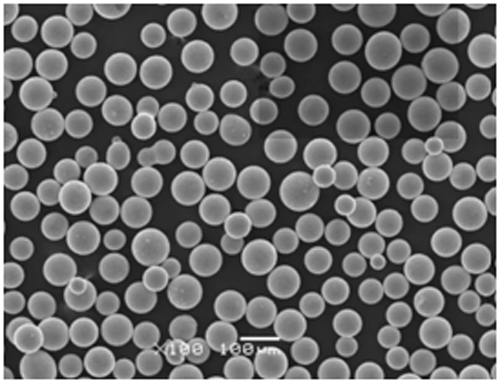
أسئلة وأجوبة
1. فيمَ يُستخدم مسحوق BNi-7؟
يُستخدم مسحوق BNi-7 في تطبيقات اللحام بالنحاس في درجات الحرارة العالية في صناعات مثل الفضاء والسيارات والإلكترونيات. إن مقاومته الممتازة للتآكل ونقطة انصهاره المنخفضة وقدرته على تشكيل وصلات قوية ومتينة تجعله مثاليًا للحام المعادن مثل الفولاذ المقاوم للصدأ والسبائك الفائقة والمواد المقاومة للحرارة.
2. ما هي المزايا الرئيسية لاستخدام مسحوق BNi-7 مقارنة بمساحيق اللحام النحاسي الأخرى؟
يوفر مسحوق BNi-7 العديد من المزايا، بما في ذلك:
- نقطة انصهار أقل، مما يقلل من الإجهاد الحراري على المواد الأساسية.
- قابلية انسيابية ممتازة، مما يسهل تشكيل وصلات متجانسة.
- مقاومة عالية للتآكل والأكسدة، خاصة في البيئات ذات درجات الحرارة العالية.
3. هل مسحوق BNi-7 مناسب للبيئات عالية الإجهاد مثل الفضاء الجوي؟
نعم، يُستخدم مسحوق BNi-7 على نطاق واسع في التطبيقات الفضائية نظرًا لخصائصه الميكانيكية القوية ومقاومته للتآكل وقدرته على تحمل درجات الحرارة العالية. وهو مفيد بشكل خاص في لحام شفرات التوربينات ومكونات المحرك والأجزاء الحرجة الأخرى.
4. كيف يمكن مقارنة مسحوق BNi-7 بمسحوق BNi-7 مع سبائك اللحام النحاسي الأخرى القائمة على النيكل مثل BNi-5؟
يتميز مسحوق BNi-7 بنقطة انصهار أقل مقارنةً ب BNi-5، مما يجعله أكثر ملاءمة لتطبيقات اللحام بالنحاس في درجات الحرارة المنخفضة. ومع ذلك، يوفر BNi-5 مقاومة فائقة للتآكل والقوة في البيئات القاسية، ولهذا السبب غالبًا ما يستخدم في المعالجة الكيميائية أو غيرها من الصناعات عالية الإجهاد.
5. هل يمكن استخدام مسحوق BNi-7 في اللحام بالنحاس المفرغ من الهواء؟
أجل، يعتبر مسحوق BNi-7 مثاليًا للحام بالنحاس المفرغ من الهواء نظرًا لانخفاض درجة انصهاره وقابليته العالية للتدفق. في الواقع، يتم استخدامه عادةً في تطبيقات اللحام بالنحاس المفرغ من الهواء حيث يفضل عدم وجود تدفق، كما أنه مطلوب رابطة نظيفة وقوية.
6. كيف يمكنني تخزين مسحوق BNi-7 للحفاظ على جودته؟
يجب تخزين مسحوق BNi-7 في بيئة جافة وباردة بعيدًا عن الرطوبة والملوثات. يجب أن يكون مناسباً
سيساعد التخزين في الحفاظ على خواصه، مما يضمن الحفاظ على قابليته للتدفق وجودة اللحام بالنحاس بمرور الوقت.
خاتمة
مسحوق BNi-7 هي مادة متميزة في عالم اللحام بالنحاس، حيث تتميز بنقطة انصهارها المنخفضة وقابليتها الفائقة للتدفق ومقاومتها للتآكل والأكسدة. سواء كنت تعمل في مجال الطيران أو السيارات أو الإلكترونيات، يمكن أن يساعدك هذا المسحوق في إنشاء وصلات قوية وموثوقة مع الحد الأدنى من التعرض للحرارة، مما يحافظ على سلامة المواد الأساسية.
مع وجود العديد من الموردين الذين يقدمون مسحوق BNi-7 بأشكال وأحجام مختلفة، ستجد الكثير من الخيارات التي تناسب احتياجاتك الخاصة. فقط تذكر أن تزن بين الإيجابيات والسلبيات - مثل التكلفة مقابل أدائه المتميز - وتذكر أن تأخذ في الاعتبار المتطلبات الفريدة لتطبيقك.
يمكن أن يكون اختيار مادة اللحام بالنحاس المناسبة هو الفرق بين الوصلة التي تدوم والوصلة التي تفشل تحت الضغط. وعندما تحتاج إلى خيار موثوق به وعالي الأداء، فإن مسحوق BNi-7 يوفر لك ذلك باستمرار.
